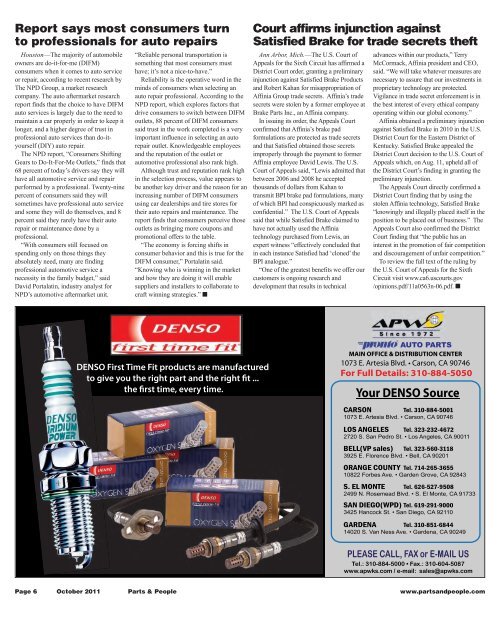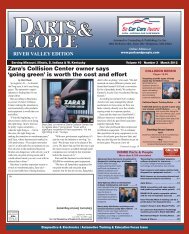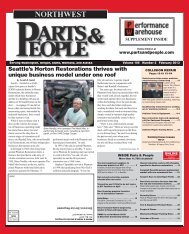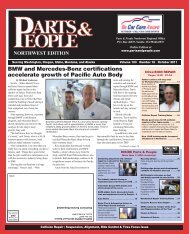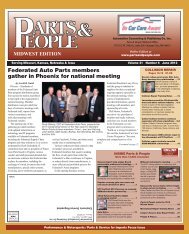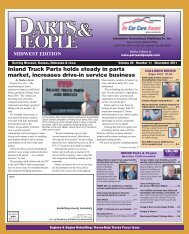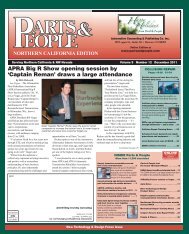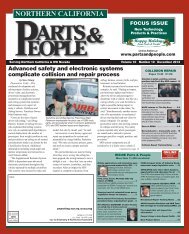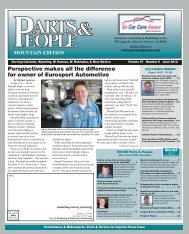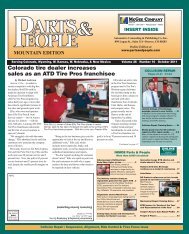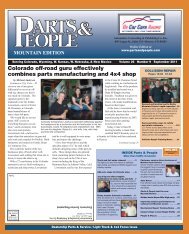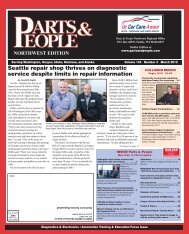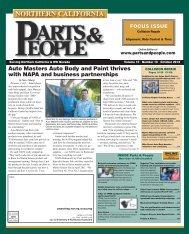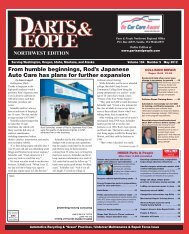SC October2011.pdf - Parts & People
SC October2011.pdf - Parts & People
SC October2011.pdf - Parts & People
You also want an ePaper? Increase the reach of your titles
YUMPU automatically turns print PDFs into web optimized ePapers that Google loves.
Report says most consumers turn<br />
to professionals for auto repairs<br />
Houston—The majority of automobile<br />
owners are do-it-for-me (DIFM)<br />
consumers when it comes to auto service<br />
or repair, according to recent research by<br />
The NPD Group, a market research<br />
company. The auto aftermarket research<br />
report finds that the choice to have DIFM<br />
auto services is largely due to the need to<br />
maintain a car properly in order to keep it<br />
longer, and a higher degree of trust in<br />
professional auto services than do-ityourself<br />
(DIY) auto repair.<br />
The NPD report, “Consumers Shifting<br />
Gears to Do-It-For-Me Outlets,” finds that<br />
68 percent of today’s drivers say they will<br />
have all automotive service and repair<br />
performed by a professional. Twenty-nine<br />
percent of consumers said they will<br />
sometimes have professional auto service<br />
and some they will do themselves, and 8<br />
percent said they rarely have their auto<br />
repair or maintenance done by a<br />
professional.<br />
“With consumers still focused on<br />
spending only on those things they<br />
absolutely need, many are finding<br />
professional automotive service a<br />
necessity in the family budget,” said<br />
David Portalatin, industry analyst for<br />
NPD’s automotive aftermarket unit.<br />
“Reliable personal transportation is<br />
something that most consumers must<br />
have; it’s not a nice-to-have.”<br />
Reliability is the operative word in the<br />
minds of consumers when selecting an<br />
auto repair professional. According to the<br />
NPD report, which explores factors that<br />
drive consumers to switch between DIFM<br />
outlets, 88 percent of DIFM consumers<br />
said trust in the work completed is a very<br />
important influence in selecting an auto<br />
repair outlet. Knowledgeable employees<br />
and the reputation of the outlet or<br />
automotive professional also rank high.<br />
Although trust and reputation rank high<br />
in the selection process, value appears to<br />
be another key driver and the reason for an<br />
increasing number of DIFM consumers<br />
using car dealerships and tire stores for<br />
their auto repairs and maintenance. The<br />
report finds that consumers perceive those<br />
outlets as bringing more coupons and<br />
promotional offers to the table.<br />
“The economy is forcing shifts in<br />
consumer behavior and this is true for the<br />
DIFM consumer,” Portalatin said.<br />
“Knowing who is winning in the market<br />
and how they are doing it will enable<br />
suppliers and installers to collaborate to<br />
craft winning strategies.” n<br />
Court affirms injunction against<br />
Satisfied Brake for trade secrets theft<br />
Ann Arbor, Mich.—The U.S. Court of<br />
Appeals for the Sixth Circuit has affirmed a<br />
District Court order, granting a preliminary<br />
injunction against Satisfied Brake Products<br />
and Robert Kahan for misappropriation of<br />
Affinia Group trade secrets. Affinia’s trade<br />
secrets were stolen by a former employee at<br />
Brake <strong>Parts</strong> Inc., an Affinia company.<br />
In issuing its order, the Appeals Court<br />
confirmed that Affinia’s brake pad<br />
formulations are protected as trade secrets<br />
and that Satisfied obtained those secrets<br />
improperly through the payment to former<br />
Affinia employee David Lewis. The U.S.<br />
Court of Appeals said, “Lewis admitted that<br />
between 2006 and 2008 he accepted<br />
thousands of dollars from Kahan to<br />
transmit BPI brake pad formulations, many<br />
of which BPI had conspicuously marked as<br />
confidential.” The U.S. Court of Appeals<br />
said that while Satisfied Brake claimed to<br />
have not actually used the Affinia<br />
technology purchased from Lewis, an<br />
expert witness “effectively concluded that<br />
in each instance Satisfied had ‘cloned’ the<br />
BPI analogue.”<br />
“One of the greatest benefits we offer our<br />
customers is ongoing research and<br />
development that results in technical<br />
advances within our products,” Terry<br />
McCormack, Affinia president and CEO,<br />
said. “We will take whatever measures are<br />
necessary to assure that our investments in<br />
proprietary technology are protected.<br />
Vigilance in trade secret enforcement is in<br />
the best interest of every ethical company<br />
operating within our global economy.”<br />
Affinia obtained a preliminary injunction<br />
against Satisfied Brake in 2010 in the U.S.<br />
District Court for the Eastern District of<br />
Kentucky. Satisfied Brake appealed the<br />
District Court decision to the U.S. Court of<br />
Appeals which, on Aug. 11, upheld all of<br />
the District Court’s finding in granting the<br />
preliminary injunction.<br />
The Appeals Court directly confirmed a<br />
District Court finding that by using the<br />
stolen Affinia technology, Satisfied Brake<br />
“knowingly and illegally placed itself in the<br />
position to be placed out of business.” The<br />
Appeals Court also confirmed the District<br />
Court finding that “the public has an<br />
interest in the promotion of fair competition<br />
and discouragement of unfair competition.”<br />
To review the full text of the ruling by<br />
the U.S. Court of Appeals for the Sixth<br />
Circuit visit www.ca6.uscourts.gov<br />
/opinions.pdf/11a0563n-06.pdf. n<br />
Page 6 October 2011 <strong>Parts</strong> & <strong>People</strong> www.partsandpeople.com


